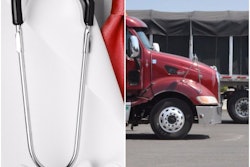The Owner-Operator Independent Drivers Association’s legal case against California’s restrictive independent contractor law, known as AB 5, was dealt another blow in court earlier this month as the Ninth Circuit Court of Appeals issued a Memorandum Opinion upholding the law.
AB 5 instituted the ABC test for employee classification. The “B” part of that test is particularly problematic for trucking companies and owner-operators' longstanding practice of contracting in lease arrangements, as it requires that a true independent contractor perform work that is outside the normal course of the hiring entity’s business.
Following the court’s decision to uphold AB 5, OOIDA expressed its disappointment and added that it’s “assessing our options at this point” for the case moving forward.
California Attorney General Rob Bonta applauded the court’s decision.
“We’re pleased with the court’s decision today to uphold AB 5’s protections,” Bonta said. “This landmark law is essential in preventing the exploitation of workers misclassified as independent contractors, including in the trucking industry, and ensures a more just and equitable economy for all Californians.”
OOIDA, which effectively took over the case from the California Trucking Association after CTA decided to not continue its challenge of the law, argued most recently that AB 5 violates the U.S. Constitution’s dormant Commerce Clause and that the business-to-business (B2B) exemption in AB 5 violates the dormant Commerce Clause and the Equal Protection Clause.

[Related: California, Teamsters respond to OOIDA's AB 5 appeal]
The B2B exception written into AB 5 rules requires, in part, that for a contractor to qualify he/she must be “free from the control and direction of the contracting business.” Yet federal Truth-in-Leasing rules, which apply to leased owner-operators and the trucking companies they're contracted to, require that motor carriers have “exclusive possession, control and use” of and “complete responsibility for the operation of” the leased owner-operator’s truck.
As such, the motor carrier control required by federal law prohibits a leased owner-operator from being “free from control or direction,” as required by the B2B exemption, OOIDA argued. AB 5 and the B2B exemption thus violate the dormant Commerce Clause by imposing a substantial burden on interstate commerce, which outweighs putative benefits.
OOIDA also contended that the B2B exception violates the dormant Commerce Clause because it discriminates against interstate commerce and violates the Equal Protection Clause because it treats interstate and intrastate drivers differently. OOIDA maintained that there is no rational basis to support this alleged disparate treatment.
In the court’s opinion released May 16, AB 5 does not violate the dormant Commerce Clause, judges said, adding that “OOIDA failed to present evidence in support of its argument that AB 5 places a substantial burden on interstate commerce.”
[Related: OOIDA's AB 5 appeal focuses on discrimination against interstate truckers]
The court noted that OOIDA argued that the law “functionally prohibits certain kinds of truck drivers from working in California,” yet the organization conceded that “AB 5 does not preclude out-of-state drivers from working in California; nor does it favor in-state drivers at the expense of out-of-state drivers,” the court said. “At worst, AB 5 restricts what kind of drivers may operate in California.”
The appeals court also ruled that the B2B exemption doesn’t violate the dormant Commerce Clause. OOIDA claimed that only in-state drivers can qualify for the exemption, making it discriminatory, but didn’t argue that the exemption itself is discriminatory, the court said.
“Rather, the organization contends that the B2B exception, when considered in conjunction with federal regulations applicable to drivers working in interstate commerce, discriminates against out-of-state drivers. We disagree with OOIDA’s interpretation of these federal regulations,” the court said. “But even if we agreed, OOIDA fails to explain how these regulations could render the B2B exception discriminatory when the regulations apply to all drivers engaged in interstate commerce, including California-based drivers.”
The court also determined that the B2B exemption doesn’t violate the Equal Protection Clause as OOIDA argued. The organization argued that the exemption violates the clause because it “favors intrastate drivers over their interstate counterparts,” but the court disagreed.
“The B2B exception treats businesses differently than individual workers,” the court said. “It does not draw a distinction between intrastate and interstate drivers. Moreover, there is a rational basis for the distinction between businesses and individual workers.”
[Related: Trucking loses latest attempt to block California's AB 5]











